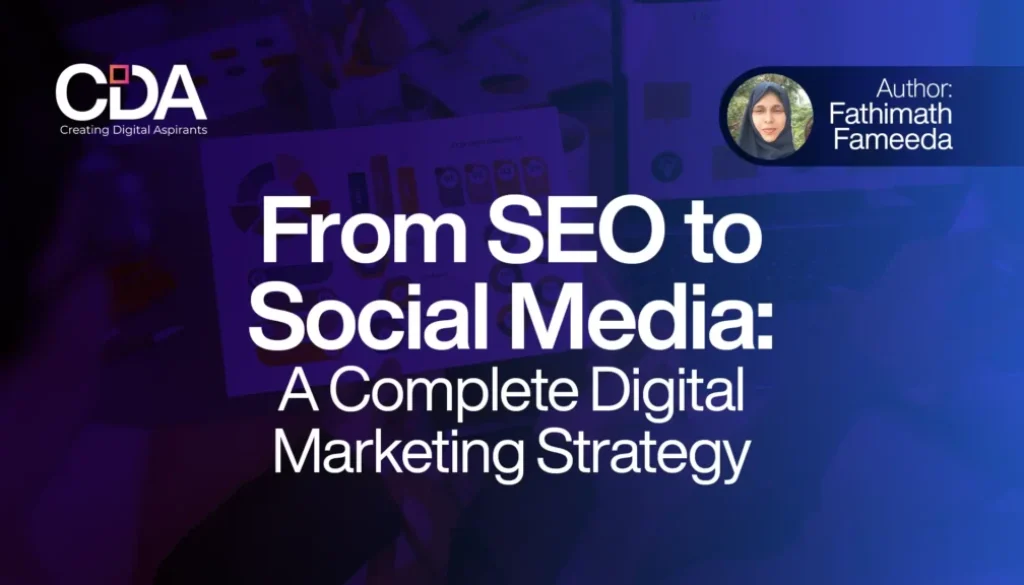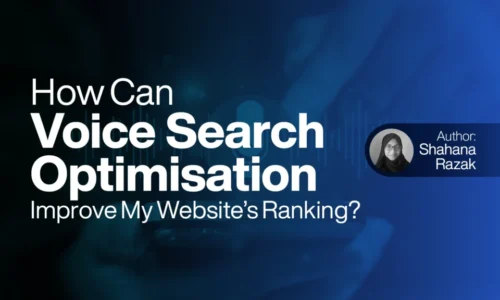From SEO To Social Media: A Complete Digital Marketing Strategy
Do you know how businesses remain active and effectively reach their target audiences in today’s digital era? I am aware of how much a thorough digital marketing strategy can influence your success, from SEO to social media.
This blog will help you grasp the key components of a successful digital marketing strategy, covering everything from SEO to social media.
Table of Contents
1. SEO (Search Engine Optimization): The Foundation of Digital Marketing
SEO is the foundation of digital marketing. It is a technique to make a website listed in the top search results for a particular set of keywords. By optimizing your website for search engines, you can enhance visibility, increase organic traffic, and ultimately connect with potential customers who are actively searching for products or services similar to yours.
Important elements of a successful SEO strategy consist of:
- Keyword Research: Keyword research is the process of identifying and analyzing the search terms that people type into search engines. The primary goal is to utilize this data for specific purposes, often related to search engine optimization (SEO) or general marketing strategies.
- On-Page Optimization: By incorporating the detected keywords into headers, titles, meta descriptions, and body text, you may optimize the content of your website. Make sure your website is easy to use, has a clear structure, loads quickly, and is responsive to mobile devices
- Content Creation: Publish relevant and valuable content that aligns with user search intent.
- Technical SEO: Ensure your website has fast loading speeds, is mobile-friendly, and is secure.
- Backlink Building (Off Page SEO): Acquire links from reputable sites to enhance your site’s authority.
- Local SEO: Make sure your company is listed in local directories, promote client testimonials, and enhance your Google My Business listing. To draw clients in your area, use local keywords.
SEO is a long-term endeavor; however, the benefits can be significant, leading to sustainable growth in traffic and engagement.
2. Content Marketing: Establishing Useful Relationships
By adding value, content marketing engages your audience and supports SEO. Content marketing concentrates on educating and establishing trust with potential customers rather than immediately marketing things.
Types of content that work well include:
- Blogs: Discuss thoughts, opinions, and industry expertise.
- Videos: Produce behind-the-scenes videos, product demonstrations, and tutorials.
- Infographics: By simplifying difficult information, visual content can increase its shareability.
- Case Studies: Provide actual instances of how your product or service has been successful.
The secret is to offer real value. Audiences are more inclined to trust your brand and think of you when they’re ready to buy anything if they find your material useful.
3. Social Media Marketing: Building Brand Presence and Engagement
Social media platforms such as Facebook, Instagram, LinkedIn, and Twitter provide excellent opportunities for businesses to connect directly with their audience. A successful social media strategy can increase conversions, build consumer loyalty, and raise brand awareness.
To create a successful social media marketing strategy, consider the following steps:
- Identify Your Platforms: Choose the platforms where your target audience is most active.
- Establish a Calendar for Content: To keep your posts consistent, plan them ahead of time.
- Interact with Followers: To create a community, reply to messages, comments, and mentions.
- Leverage Ads: Utilize paid social advertisements to expand your reach and target specific audiences.
Social media can be one of the most powerful ways to humanize your brand by allowing real-time interactions and helping you develop deeper relationships with your customers.
4. Email Marketing: Developing Leads and Increasing Conversions
Email marketing continues to be one of the best-converting tactics, even with the emergence of newer platforms. A well-crafted email marketing campaign can nurture leads, re-engage customers, and drive sales.
Effective email marketing tips include:
- Divide Up Your Audience: Customize your message for each group of people.
- Personalize Content: Use customer data to create relevant content.
- Automate Campaigns: Set up automated emails for welcome sequences, product recommendations, and cart abandonment.
- Track and Optimize: To improve your approach, keep an eye on conversions, click-through rates, and open rates.
- Email marketing offers a unique advantage: it allows for one-on-one interaction with leads and existing customers.
5. PPC (Pay-Per-Click) Advertising: Driving Quick, Targeted Traffic
While organic methods like SEO take time, PPC advertising can bring immediate traffic to your website. Google Ads, Meta Ads (Facebook & Instagram), and LinkedIn Ads are some popular platforms to launch PPC campaigns.
To optimize your PPC strategy:
- Search for keywords: Pay attention to high-intent terms that have a high conversion rate.
- Set Clear Goals: Define objectives like leads, sales, or brand awareness.
- Optimize Ad Copy: Make sure your ads are compelling and contain a strong call to action.
- Monitor and Adjust: Analyze performance metrics regularly and adjust bids, keywords, and targeting to improve results.
With PPC, you’re paying for clicks, so every aspect of your campaign should be meticulously planned to get the best return on investment (ROI).
6. Analytics and Data-Driven Optimization
Analytics is crucial for integrating your digital marketing strategies. By using tools like Google Analytics, social media insights, and email reports, you can effectively track performance and make informed decisions.
Key metrics to monitor include:
- Website traffic and user behavior
- Conversion rates across channels
- Social media engagement
- ROI on PPC campaigns
Regularly analyzing these metrics helps you identify successes, areas for improvement, and optimal resource allocation.
Conclusion
Creating a comprehensive digital marketing strategy that encompasses SEO, content marketing, social media, email marketing, PPC, and analytics ensures your online presence is optimized. This unified strategy increases conversions, fosters relationships, and increases traffic.
Whether you’re a business owner or managing client marketing, a complete digital strategy can transform your digital presence. Set clear goals, invest wisely, and continuously monitor results. Digital marketing is about meaningful connections and building a lasting brand.



